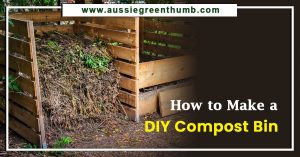To be honest, I’m a big fan of sheep manure. It’s a deserved attraction because, as animal manures go, it has countless benefits – one of the major ones being it won’t stink out the garden and be the cause of neighbour angst.
Odour aside, sheep manure is an incredibly versatile animal manure. One of the benefits that I like the most is its ability to be used for more than just a soil amendment.
As it’s so cheap here in Australia, being the 2nd highest producer of sheep in the world (China -1st, NZ – 6th, UK – 7th and US – 11th), I’ve started using sheep manure as mulch. Mulch? Are you sure that’s wise? Sure it is. Let us find out why!
More...
Using Sheep Manure in the Garden
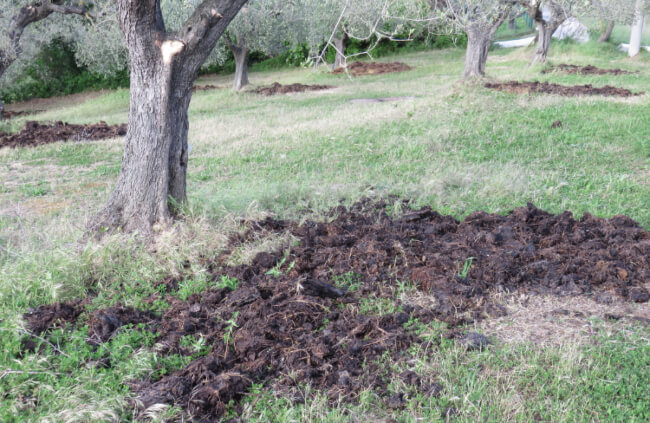
Sheep manure is low in nitrogen – compared to other animal manures – so it won’t burn your plants. Plus, it’s a natural slow-release fertiliser and this is part of the versatility of using sheep manure as a mulch.
I usually pour it on to about a depth of 50 mm (2") ensuring that it doesn’t touch the plant’s stem. Then I just water it as I would normally reticulate the garden.
I’ve found a local supplier where I can get guaranteed weed-free marbles at a rate of $10 for a 100 L bag which is fairly cheap (comparably cow manure costs $8 for 25L and chicken approx $11+ for 25L).
The only down-side is that the manure is very dry and takes a few days before it will retain enough moisture to begin breaking down. Some gardeners will only ever dig it into their beds arguing that unless you do, it will become so hard that it will never break down.
This is not the case and when piled as high as I do, you can dig into the manure mulch within a few weeks and see the layer directly above the soil beginning to decompose.
Benefits of Sheep Manure
So what are the myriad of benefits for using sheep manure;
- Natural slow-release fertiliser
- Can be used as an organic mulch
- Low-odour
- Easy to handle
- Relatively inexpensive
- Fairly easy to obtain and most providers usually offer door-side delivery
- Lower in nitrogen than other manures yet still high in Phosphorus and Potassium – great for plant growth
- Depending on the source, can be obtained weed-free
- Looks great
While I do use other manures in my garden – chicken manure in the veggie patch, horse and cow as additives for the compost heap – I much prefer sheep manure in my garden beds.
How to Use Sheep Manure in The Garden
If you are buying sheep manure from Bunnings or a garden centre it is probably already rotted or well-rotted. In which case, you just throw it straight onto your garden beds and that is all you have to do.
If you get sheep manure from a farm, how you use it will depend on what you are using it with or on.
For example, hard-stemmed mature plants like roses can withstand sheep manure in its fresh state, but it is always best to keep any manure-based mulch away from the stems of plants (it can cause rot by holding moisture up against stems or trunks).
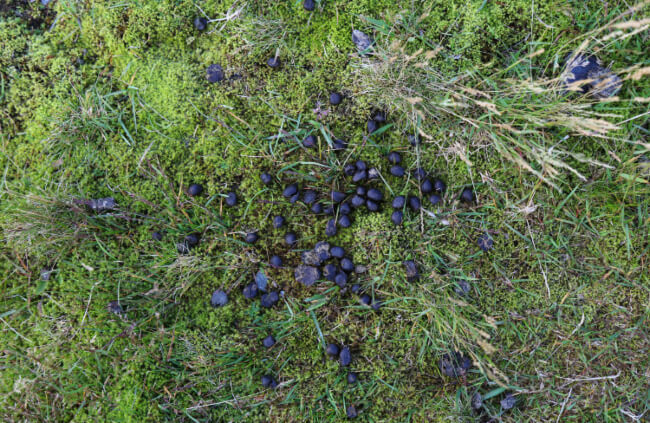
How to Compost or Make Rotted Sheep Manure
To rot sheep manure down, just pile it up in a bright spot in the garden and let nature take its course. Speed the process up by turning the pile once every two weeks for about three months, until it is ready to use.
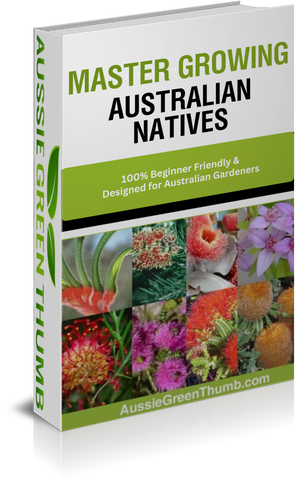

Get Your Free Guide:
Master Growing Australian Natives eBook
A Must Have Complete Guide for Every Australian Garden
Get Your Free Guide:
Master Growing Australian Natives eBook
A Must Have Complete Guide for Every Australian Garden
Once it has rotted, the texture of sheep manure will change, and it will not have that same acidic ammonia smell that it did when it was fresh.
Use rotted sheep manure as:
- Soil additive when planting shrubs
- Top dressing mulch for shrubs
- Top dressing mulch for herbaceous plants
- Mulch or soil improver feed to prepare soil before planting veggies
How to Use Fresh Sheep Manure
There are not as many choices for fresh sheep manure, but it is still a useful fertiliser for your garden.
With a high nitrogen content, and relatively high ammonia compared to compost, sheep manure can still burn tender or soft-stemmed plants, and its high moisture content can cause rot around the base of some shrubs too.
The best ways to use fresh sheep manure are around mature plants that cannot be shocked easily. Fruit trees really benefit from sheep manure, and it can be applied generously along the base of hedges.
Use fresh sheep manure as:
- Mulch for shrubs or fruit trees
- To make slurries to improve larger open veggie beds 2-weeks before planting
When Not to Use Sheep Manure
Some native plants have a particularly high sensitivity to phosphorus, which sheep manure is notably high in. Avoid using sheep manure on plants like Acacia, Banksia, Olearia, Hibiscus, Grevillea and Hardenbergia.
Other than that, you can use sheep manure just as you would use any other farmyard manure in the garden.
Frequently Asked Questions About Sheep Manure
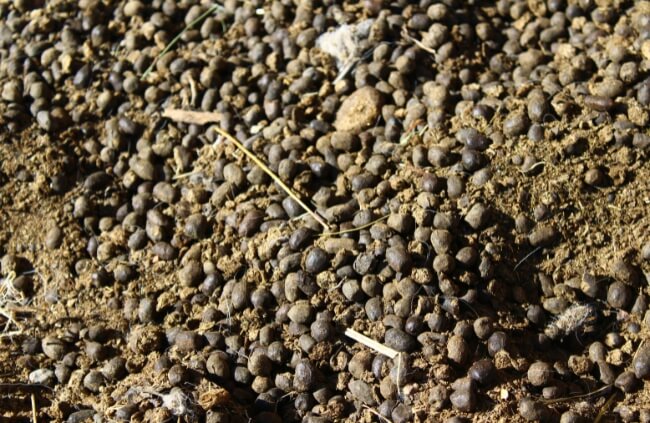
Does sheep manure burn plants?
Sheep manure can burn your plants when used fresh, so use it with the same precautions as cow or horse manure. Because sheep have a diet of entirely grass and straw, their manure is very high in nitrogen and concentrated ammonia.
The latter will have a pungent scent when fresh, which dissipates when sheep manure is ready to use.
Is sheep manure good for native plants?
Sheep manure is a great choice for native shrubs and can be mulched directly under hedges when fresh from the farm. Like any manure, keep it away from stems or trunks, and make sure specific plants are suitable candidates for sheep manure mulching as it can add phosphorus which some natives are sensitive to.
Does sheep manure need to be composted?
Sheep manure does not need to be composted and can be used straight away but it is much safer to compost it down slightly for a few months before using sheep manure if you want to use it as a general-purpose mulch.
Is sheep manure good for the garden?
Sheep manure is great for any garden, and depending on where you live, is much more accessible (and affordable) than horse manure. Sheep manure is particularly useful for gardens with poor soil as it tends to retain more minerals and micronutrients than cow or horse manure, depending on where the sheep feed.
What is sheep manure good for?
Sheep manure is particularly effective as a fertiliser or soil treatment before planting cucurbits (cucumbers, squash, pumpkins, melons, courgettes). They require mineral-rich, and nitrogen-rich soil, which sheep manure is great at providing.
Is sheep manure high in nitrogen?
Sheep manure is very high in nitrogen. Most wet manures from large grazing mammals are, as they remove other nutrients from grass leaving much of the natural nitrogen behind in their droppings.
This is the case for smaller mammals like rabbits too, but dry manures are less acidic, and therefore less effective on most soils.
Can you put sheep manure straight on the garden?
You can put sheep manure straight on the garden, but it depends heavily on the plants you use it around. If you are adding sheep manure to shrub borders, it will almost definitely be ok as long as it doesn’t touch the trunks. If you add sheep manure to herbaceous borders, rot it down first.
Is sheep manure good for vegetable gardens?
Sheep manure is good for vegetable gardens, but horse manure is a more effective all-round fertiliser for veggies thanks to its consistency and the moisture retention from larger parts of rotted materials – usually attributed to the dried hay feeds. Sheep manure is finer and easier to work with once rotted, but slightly less acidic.
Is sheep manure good for plants?
Sheep manure has plenty of phosphorus and potassium, so watch out on some native plants. But in general, sheep manure is good for your plants, and will help to improve soil structure over time too.
Is sheep manure good for roses?
The traditional manure for roses is horse manure, but sheep manure is fantastic for roses too. This type of manure offers everything that developing roses need to grow.
Is sheep manure good for tomatoes?
While there are not many conclusive studies comparing sheep manure and horse manure, there are some arguments and anecdotal evidence that suggest sheep manure is actually a more effective soil treatment for tomatoes than horse manure. This is because it offers more minerals and can potentially help prevent diseases.
Can sheep manure be used as compost?
Sheep manure makes fantastic compost, and will rot down faster than other manures if you turn it regularly. Its slightly lower ammonia content means sheep manure can be used sooner too, so whether you add it to your compost, or compost it by itself, you will have an excellent nutrient-rich resource for your garden.
Reap the Benefits of Using Sheep Manure
Sheep manure is an outstanding natural resource, and should be a very welcome addition to your garden at any time of year. With the potential to use it as a slurry, or mulch directly around the base of mature trees and shrubs, sheep manure is an adaptable mulch and a great plant fertiliser.
The only precaution is around phosphorus content, which can shock some native species, but speaking in general terms, there aren’t many plants that won’t benefit from the even mixture of nutrients and minerals that come with a generous application of part-rotted sheep manure.
Published on December 27, 2023 by Gary Clarke
Last Updated on December 27, 2023



